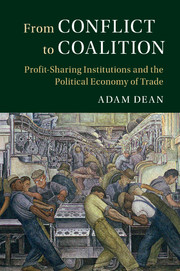Book contents
- Frontmatter
- Dedication
- Contents
- List of Figures
- List of Tables
- Acknowledgments
- 1 Introduction
- 2 A Theory of Profit-Sharing Institutions
- 3 Evidence and Research Design
- 4 The Gilded Wage: Trade Politics in the American Textile and Steel Industries
- 5 Liberalized by Labor
- 6 Trade Politics in Britain and Argentina
- 7 Power Over Profits
- 8 Conclusion
- References
- Index
- Miscellaneous Endmatter
6 - Trade Politics in Britain and Argentina
Published online by Cambridge University Press: 05 September 2016
- Frontmatter
- Dedication
- Contents
- List of Figures
- List of Tables
- Acknowledgments
- 1 Introduction
- 2 A Theory of Profit-Sharing Institutions
- 3 Evidence and Research Design
- 4 The Gilded Wage: Trade Politics in the American Textile and Steel Industries
- 5 Liberalized by Labor
- 6 Trade Politics in Britain and Argentina
- 7 Power Over Profits
- 8 Conclusion
- References
- Index
- Miscellaneous Endmatter
Summary
As the previous chapters on American trade politics demonstrated, capital and labor are unlikely to share the same trade policy preferences in the absence of profit-sharing institutions. Building off these findings, this chapter seeks to demonstrate that the effect of profit-sharing institutions on workers’ trade policy preferences is generalizable across space and time. This chapter presents two case studies of the political economy of trade from the past two centuries. First, Britain during the 1840s and the political economy of the repeal of the Corn Laws. Second, Argentina during the interwar years and the political economy of import-substitution industrialization.
In both cases, the neoclassical approach makes clear predictions about the trade policy preferences of workers. In Britain, workers are predicted to join capital in favor of free trade and the repeal of the Corn Laws. In Argentina, workers are predicted to join capital in favor of trade protection and the implementation of import-substitution industrialization. Rogowski makes these precise predictions and goes on to claim that the historical record supports such claims. While Hiscox does not discuss Argentine trade politics, his predictions and historical account of the British case are both in complete agreement with Rogowski. In direct contrast, I will show that British workers were skeptical of the benefits of free trade, and argued that industrial profits would increase without an increase in wages. Argentine workers, whether organized as labor unions or political parties, actually opposed import-substitution industrialization throughout the 1930s. It was not until Juan Perón's pro-labor reforms in the early 1940s that Argentine workers obtained profit-sharing institutions and then joined their employers in favor of protection.
The British and Argentine cases were carefully selected to accomplish two important methodological goals. First, both offer additional crucial cases for comparing my theory to extant political economy theories; my predictions and findings directly contradict the field's conventional wisdom in both cases. In this sense, the well-studied British case is particularly powerful in demonstrating the theoretical and empirical shortcomings of previous research, as well as the contributions of my own. Second, these cases allow me to test the generalizability of my theory using a “most different, similar outcome approach.” Despite the tremendous differences between the British, Argentine, and American cases, each displays the same timeless dynamic: workers disagree with their employers concerning international trade unless profit-sharing institutions establish a credible connection between an industry's profits and workers’ wages.
- Type
- Chapter
- Information
- From Conflict to CoalitionProfit-Sharing Institutions and the Political Economy of Trade, pp. 138 - 164Publisher: Cambridge University PressPrint publication year: 2016

